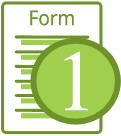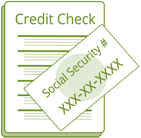“Government-backed loans” is a term that can be pretty loosely tossed around. The fact is the government does not make mortgage loans; they have agencies that insure mortgage loans. The two government agencies that insure mortgage loans are the Federal Housing Administration (FHA) and the Veterans Administration (VA).
In simple terms, these two agencies insure the mortgage lenders against losses if the borrower should default on their loan. This in return, minimizes the risk that a mortgage lender has to take on a loan where a borrower may have a less than desirable down payment or a less than desirable credit history. By minimizing the risk to the mortgage originators, borrowers who normally do not meet stricter lending requirements are allowed the opportunity to participate in the home buying process and become homeowners.
The FHA and VA set minimal mortgage loan criteria that the mortgage lenders must adhere to, for instance, credit worthiness, employment requirements, indebtedness, and down payment requirements, before they will insure a mortgage loan, but be aware, some mortgage lenders can and do have tougher lending requirements than either of these agencies may require, so it pays to shop around and ask!
Here’s a brief description of the programs that the FHA and VA have to offer:
FHA
The Federal Housing Administration was created as part of the National Housing Act of 1934. The goal of creating the FHA was to improve housing standards and conditions, provide an adequate home financing system by providing insurance for mortgage loans and to stabilize the mortgage market during the Great Depression.
Government insured FHA loans are generally mostly popular among first time home buyers due to the lower down payment requirement and to less credit worthy borrowers because of the easier qualification standards required to secure a loan.
If you’re a FHA qualified home buyer, you can purchase a home with a down payment as low as 3.5 percent. This is a substantial advantage considering most conforming loans usually require down payments of 20 percent. Subsequently, due to the higher risk of a lower down payment, FHA insured loans usually come with a higher interest rate on your mortgage loan.
FHA insured loans also require Payment Mortgage Insurance (PMI), not only on an annual (paid monthly) basis, but also in a lump sum payment upfront as part of your closing costs.
Current annual fees are as follows:
On loans with greater than 15 year terms, if the down payment is equal to or greater than 5 percent, the annual premium is 1.1 percent. If the down payment is less than 5 percent, the annual premium is 1.15 percent.
On loans equal to or less than 15 year terms, if the down payment is equal to or greater than 10 percent, the annual premium is 0.25 percent. If the down payment is less than 10 percent, the annual premium is 0.5 percent.
The current premium rate for the Upfront Mortgage Insurance Premium for FHA regular purchases and refinanced mortgages is 1.00 percent.
FHA backed mortgage loans typically have loan limitations. Loan limitations can vary from area to area and are also subject to change depending on market conditions. You can find the loan limits for FHA loans here:
https://entp.hud.gov/idapp/html/hicostlook.cfm
In the aftermath of the housing crisis, FHA lending standards have evolved and will probably continue to evolve in the future as the government determines its role in the housing market place.
VA
The VA Home Loan Guaranty Program was established in 1944 to aid Veterans returning from war. The goal of VA Home Loan Benefits was to help Veterans purchase or refinance a home in gratitude for the sacrifices they made by serving our country.
VA insured loans are available to eligible veterans for the purchase of a home which must be for their own personal occupancy.
VA insured loans have two advantages over FHA loans; zero down payment loans are available and VA insured loans don’t require PMI insurance. However, VA loans do require a VA funding fee of between 2.15 percent to 3.3 percent depending on certain criteria. The good news is the funding fee can be financed in your loan.
Along with the zero down payment option and the ability to finance the VA funding fee, VA insured loans are also assumable (even by non-veterans) and do not have any early payment fees.
VA insured loans, like FHA insured loans, have loan limits that can vary from area to area. You can find the loan limits for VA backed loans here:
http://www.benefits.va.gov/homeloans/loan_limits.asp
The only real downside to VA loans is home sellers are required to pay a part of your closing cost fees, so sometimes it is difficult to find sellers willing to sell to a prospective home buyer looking for VA terms.




